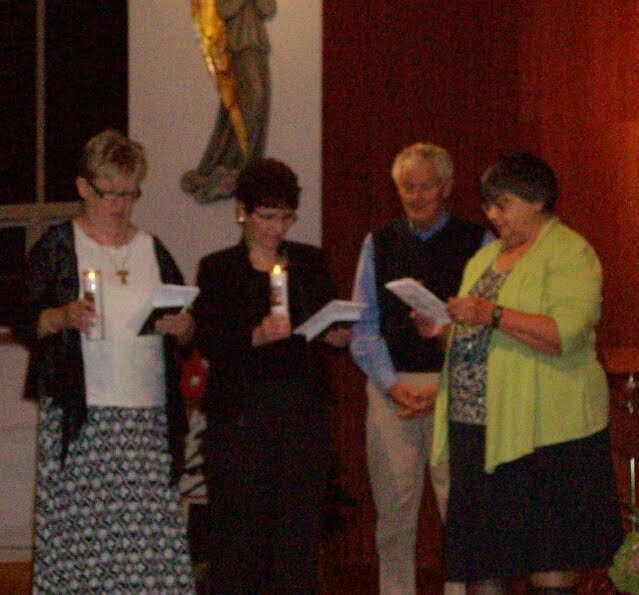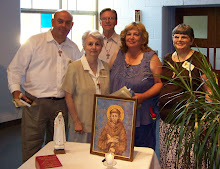In light of recent changes in the Mass to conform with the Latin original, the same thing is happening with the acronym for the Secular Franciscan Order:
THE OFFICIAL NAME OF THE ORDER
THE USE AND THE TRANSLATION OF THE NAME OF THE ORDER
1. The official name of the Order is Ordo Franciscanus Sæcularis.
2. Translations of the name of the Order
2.1. The translation of the name of the Order is already made in the four official languages, and these are the ones to be used in these languages, namely in Italian, in English, in Spanish and in French.
2.2. The name can be translated into local languages only when the literal translation from Latin is easily understandable even by the civil society and does not change its meaning or substance.
2.3. When the translation into the national language distorts the meaning of the name, or is linguistically impossible to transfer the genuine meaning, Ordo Franciscanus Sæcularis must always be used, which can be followed by expressions to clarify and make more understandable the nature of the Secular Franciscan Order to everyone in the local language.
3. The acronym
The acronym which refers to the name Ordo Franciscanus Sæcularis is OFS and is always to be used regardless of the language. For example, when Secular Franciscans use the acronym after their name, they must use “OFS”.
Encarnación del Pozo, OFS
General Minister
Pax et bonum
Thursday, January 26, 2012
Sunday, January 22, 2012
Gathered around the manger
From the National Minister:
GATHERED AROUND THE MANGER IN 2012
By worldly standards, Jesus Christ certainly did not make a triumphal entry. Our God before time chose to be born as a poor innocent child in time and laid "in a manger because there was no room for them in the inn" (Luke 2:7). In the Eastern Church, this manger scene is in a sepulcher, a cave, as in Giotto's painting above. In the Western Church, this manger scene is in a lowly stable, where we find, as above, the ox and the ass paying homage, but where is the rest of creation, where is humanity?
Well, soon around this humble scene will come even humbler shepherds "living in the fields and keeping night watch over their flock" (Luke 2:8). They will find Mary and Joseph, and they will see the infant "lying in the manger" (Luke 2:16) at some point on that first night of Christmas.
The second day of Christmas (December 26), we honor the martyred St. Stephen, the first named deacon and proclaimed by Holy Mother Church as "First Martyr." What is he doing gathered around the manger?
The third day of Christmas (December 27), we get the beloved apostle John who certainly deserves his place around the manger. After all, the prologue of his great Gospel reads, "And the Word became flesh and made his dwelling among us, and we saw his glory, the glory as of the Father's only Son, full of grace and truth" (John 1:14). And his first letter reads, "What was from the beginning, what we have heard, what we have seen with our eyes, what we looked upon and touched with our hands concerns the Word of life" (1 John 1:1). John deserves his place, but why at this time? Wasn’t he born at least ten years after these days at the manger?
The fourth day of Christmas (December 28), we get the Holy Innocents, when Herod "ordered the massacre of all the boys in Bethlehem and its vicinity two years old and under" (Matthew 2:16). What was their crime? It seems they have been conceived and born in the wrong place at an inconvenient time.
The fifth day of Christmas (December 29), we get St. Thomas Becket, murdered at Canterbury Cathedral because his old friend the King no longer agreed with his Church politics.
Goodness! What a confusing and bloody mess this manger scene has become!
But wait. We see and hear a choir of angels, praising God, saying, "Glory to God in the highest and on earth peace to those on whom his favor rests" (Luke 2:14). Stephen, the Holy Innocents and Thomas do not look so aggrieved at their fates; rather, they are also praising God. Their souls are at peace. They are honored and praised themselves.
How is this possible? How does this work? Can the reason for all of this be that little child? Doesn't this manger scene celebrate at the same time both human weakness and divine power?
We have a helpless newborn babe born into almost complete poverty in a borrowed manger, and this is our Savior, our "Wonder-Counselor, God-Hero, Father Forever, Prince of Peace" (Isaiah 9:6).
We have a human stepfather, a working-class guy, who never says a single word in all of Holy Scripture, yet he is one of our greatest saints, St. Joseph, the only human being ever entrusted with the direct physical care and protection of the Child Jesus and His Mother Mary.
We have this childlike virgin unknown to everyone in the city of David except Jesus and Joseph, and she alone of all humanity is the Mother of God, the Theotokos, the Mother of the Church.
We have Stephen, the Holy Innocents and Thomas all murdered out of human weakness, anger, fear; yet all have triumphed over human weakness, even their own human weakness.
And make no mistake. God is always God even as a human child. The author of creation surely comes into creation with His eyes wide open. The creator of humanity certainly knows the human heart. "Jesus would not trust himself to them because he knew them all, and did not need anyone to testify about human nature. He himself understood it well" (John 2:24-25).
Jesus came in poverty because there was and still is poverty in the world and in our hearts. Jesus came helpless because all, including ourselves, are helpless when it comes to deserving everlasting life. Jesus came in peace because the world and our hearts still and always seek peace.
So let us reserve a place in our hearts and minds for this manger scene, as our Father St. Francis always did. Knowing all about the world and all about each one of us, Jesus still and always comes in peace and love.
And as we leave this manger scene and pay more attention to the confusing, bloody mess our world always offers, let us pray for a continuing and true Spirit of Christmas throughout all this New Year of Grace 2012 that we may each day thank Jesus for manifesting Himself and coming into our world and into our lives. Let us each day do what we can to manifest that gift of Peace and Love to one another and to ourselves.
May the Lord always give us this Peace! Merry Christmas! Happy New Year!
Tom
Pax et bonum
GATHERED AROUND THE MANGER IN 2012
By worldly standards, Jesus Christ certainly did not make a triumphal entry. Our God before time chose to be born as a poor innocent child in time and laid "in a manger because there was no room for them in the inn" (Luke 2:7). In the Eastern Church, this manger scene is in a sepulcher, a cave, as in Giotto's painting above. In the Western Church, this manger scene is in a lowly stable, where we find, as above, the ox and the ass paying homage, but where is the rest of creation, where is humanity?
Well, soon around this humble scene will come even humbler shepherds "living in the fields and keeping night watch over their flock" (Luke 2:8). They will find Mary and Joseph, and they will see the infant "lying in the manger" (Luke 2:16) at some point on that first night of Christmas.
The second day of Christmas (December 26), we honor the martyred St. Stephen, the first named deacon and proclaimed by Holy Mother Church as "First Martyr." What is he doing gathered around the manger?
The third day of Christmas (December 27), we get the beloved apostle John who certainly deserves his place around the manger. After all, the prologue of his great Gospel reads, "And the Word became flesh and made his dwelling among us, and we saw his glory, the glory as of the Father's only Son, full of grace and truth" (John 1:14). And his first letter reads, "What was from the beginning, what we have heard, what we have seen with our eyes, what we looked upon and touched with our hands concerns the Word of life" (1 John 1:1). John deserves his place, but why at this time? Wasn’t he born at least ten years after these days at the manger?
The fourth day of Christmas (December 28), we get the Holy Innocents, when Herod "ordered the massacre of all the boys in Bethlehem and its vicinity two years old and under" (Matthew 2:16). What was their crime? It seems they have been conceived and born in the wrong place at an inconvenient time.
The fifth day of Christmas (December 29), we get St. Thomas Becket, murdered at Canterbury Cathedral because his old friend the King no longer agreed with his Church politics.
Goodness! What a confusing and bloody mess this manger scene has become!
But wait. We see and hear a choir of angels, praising God, saying, "Glory to God in the highest and on earth peace to those on whom his favor rests" (Luke 2:14). Stephen, the Holy Innocents and Thomas do not look so aggrieved at their fates; rather, they are also praising God. Their souls are at peace. They are honored and praised themselves.
How is this possible? How does this work? Can the reason for all of this be that little child? Doesn't this manger scene celebrate at the same time both human weakness and divine power?
We have a helpless newborn babe born into almost complete poverty in a borrowed manger, and this is our Savior, our "Wonder-Counselor, God-Hero, Father Forever, Prince of Peace" (Isaiah 9:6).
We have a human stepfather, a working-class guy, who never says a single word in all of Holy Scripture, yet he is one of our greatest saints, St. Joseph, the only human being ever entrusted with the direct physical care and protection of the Child Jesus and His Mother Mary.
We have this childlike virgin unknown to everyone in the city of David except Jesus and Joseph, and she alone of all humanity is the Mother of God, the Theotokos, the Mother of the Church.
We have Stephen, the Holy Innocents and Thomas all murdered out of human weakness, anger, fear; yet all have triumphed over human weakness, even their own human weakness.
And make no mistake. God is always God even as a human child. The author of creation surely comes into creation with His eyes wide open. The creator of humanity certainly knows the human heart. "Jesus would not trust himself to them because he knew them all, and did not need anyone to testify about human nature. He himself understood it well" (John 2:24-25).
Jesus came in poverty because there was and still is poverty in the world and in our hearts. Jesus came helpless because all, including ourselves, are helpless when it comes to deserving everlasting life. Jesus came in peace because the world and our hearts still and always seek peace.
So let us reserve a place in our hearts and minds for this manger scene, as our Father St. Francis always did. Knowing all about the world and all about each one of us, Jesus still and always comes in peace and love.
And as we leave this manger scene and pay more attention to the confusing, bloody mess our world always offers, let us pray for a continuing and true Spirit of Christmas throughout all this New Year of Grace 2012 that we may each day thank Jesus for manifesting Himself and coming into our world and into our lives. Let us each day do what we can to manifest that gift of Peace and Love to one another and to ourselves.
May the Lord always give us this Peace! Merry Christmas! Happy New Year!
Tom
Pax et bonum
Subscribe to:
Posts (Atom)


